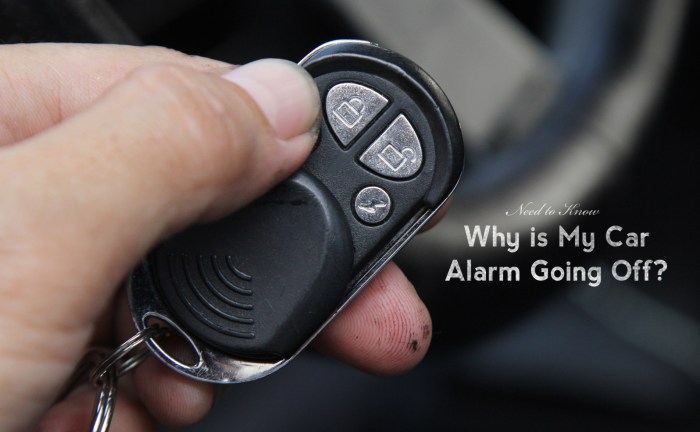Why does my car alarm keep going off? It’s the question keeping you up at night, right? That incessant shriek tearing through the quiet of your neighborhood (or worse, your own peaceful slumber). Believe it or not, there are tons of reasons why your car alarm might be acting like a hyperactive chihuahua. From faulty sensors to mischievous squirrels (yes, really!), we’re diving deep into the mystery of the perpetually-ringing car alarm.
Get ready to become a car alarm whisperer.
This guide covers everything from simple DIY fixes—like checking your battery connection—to understanding the intricacies of your car’s alarm system, and knowing when to call in the pros. We’ll explore common causes of false alarms, troubleshooting steps, and preventative measures to keep that annoying siren silent. So buckle up, and let’s get to the bottom of this noisy situation!
Common Causes of False Alarms

So, your car alarm’s been acting like a hyperactive chihuahua? It’s super annoying, right? Let’s dive into the most common reasons why your car alarm might be going off for no apparent reason. Understanding these causes can save you a lot of frustration (and maybe even some sleep!).
False alarms are usually caused by a combination of internal car issues, external environmental factors, or sometimes even a simple glitch. Let’s break it down.
Internal Car Components Contributing to False Alarms
Several internal components can malfunction and trigger your car alarm. Here’s a handy table to help you troubleshoot:
| Component Name | Possible Malfunction | Potential Solutions |
|---|---|---|
| Door Lock Actuator | Faulty wiring, sticking mechanism, or internal failure can cause the system to think a door is ajar. | Check wiring for damage, lubricate the mechanism (if accessible), or replace the faulty actuator. A professional mechanic might be needed. |
| Hood Latch Switch | The switch might be misaligned, broken, or simply worn out, leading to the alarm thinking the hood is open. | Adjust the switch alignment, replace the switch, or have a mechanic assess the hood latch mechanism. |
| Shock Sensor | A sensitive or faulty shock sensor can be triggered by minor bumps, vibrations (like a nearby garbage truck), or even temperature fluctuations. | Adjust the sensitivity of the sensor (if possible), replace the sensor, or consult a professional for alarm system recalibration. |
| Battery | A dying battery can cause erratic electrical signals, potentially leading to false alarms. | Get your car battery tested and replaced if necessary. A low battery can also cause other electrical issues. |
Environmental Factors Triggering False Alarms
Believe it or not, the weather and your surroundings can also be to blame. Extreme conditions can wreak havoc on your car’s electronics.
For example, intense heat can cause expansion and contraction of metal components, potentially triggering the alarm system. Similarly, heavy rain or hail can cause water to seep into sensitive areas, leading to short circuits and unexpected activation. Strong winds can also shake your car enough to set off a sensitive shock sensor.
External Factors Causing False Alarms
External events can also be responsible. Imagine construction work nearby. The vibrations from heavy machinery could easily set off a sensitive shock sensor. Loud noises, like a nearby thunderstorm or fireworks, might also be misinterpreted as an intrusion attempt.
Another example: a stray animal bumping into your car could trigger the shock sensor. Even a simple thing like a tree branch brushing against your car could, in some cases, cause a false alarm.
Troubleshooting Steps for DIY Fixes

So, your car alarm’s acting up? Before you call a pro, let’s try some basic troubleshooting. Many false alarms stem from simple issues you can fix yourself, saving you time and money. This section Artikels a few DIY approaches to tackling a persistent car alarm problem. Remember safety first! Always disconnect the negative battery terminal before working directly with your car’s electrical system.
Checking the Car’s Battery Connection
A loose or corroded battery connection is a surprisingly common culprit behind car alarm malfunctions. A weak connection can cause erratic electrical signals, triggering the alarm. Here’s how to check:
- Locate the battery: Usually found under the hood, but some cars have them in the trunk. Consult your owner’s manual if you’re unsure.
- Disconnect the negative terminal: This is usually the black cable. Use a wrench to loosen the nut and carefully remove the cable.
- Inspect the terminals: Look for corrosion (a white, powdery substance) on the terminals or cable ends. Also check for looseness or damage.
- Clean the terminals: If corrosion is present, use a wire brush or battery terminal cleaner to remove it. Make sure the metal is clean and shiny.
- Tighten the connections: Securely tighten the nut on the negative terminal cable. Ensure a firm connection.
- Reconnect the negative terminal: Carefully attach the negative cable back to the terminal and tighten the nut.
- Test the alarm: Try locking and unlocking your car to see if the alarm is still malfunctioning.
Troubleshooting a Malfunctioning Alarm System Flowchart, Why does my car alarm keep going off?
The following flowchart visually represents a systematic approach to troubleshooting your car alarm. This step-by-step process helps isolate the problem.[Imagine a flowchart here. The flowchart would begin with a “Start” box. It would then branch to “Check Battery Connection” (leading to the steps Artikeld above). If the problem persists, it would branch to “Check Remote Battery/Functionality” (detailed below).
If still unresolved, it would branch to “Check Alarm System Components (Sensors, etc.)” (This would require more advanced knowledge and tools, and likely professional assistance). Finally, a “Problem Solved?” box would lead to either “Yes” (end) or “No” (potentially requiring professional help). Each step would have arrows indicating the flow of the troubleshooting process.]
Testing the Car Alarm’s Remote Control Functionality
A faulty remote can trigger false alarms or prevent the system from arming correctly. Testing involves these steps:
- Check the remote’s battery: Open the remote and replace the battery if it’s weak or dead. Many remotes use standard button-cell batteries.
- Test range: Move away from your car, gradually increasing the distance, while attempting to lock and unlock it. Note the distance at which the remote stops working reliably. A short range might indicate a weak battery or internal remote issue.
- Try different buttons: If you have multiple functions (lock, unlock, panic), test each one individually to identify if the problem is isolated to a specific button.
- Try a spare remote (if available): If you have a spare remote, try using it to see if the problem lies with the remote itself or the car’s alarm system.
Temporarily Disabling the Alarm System
In some situations, temporarily disabling the alarm can be necessary. However, this should only be done if it’s safe to do so and you understand the implications. Disconnecting the battery is the most common method. Refer to your owner’s manual for manufacturer-specific instructions. Improperly disabling the alarm could void warranties or compromise your vehicle’s security.
Understanding Your Car Alarm System: Why Does My Car Alarm Keep Going Off?
Car alarms, while designed to protect your vehicle, can sometimes become a source of frustration due to false alarms. Understanding how your car alarm system works can help you troubleshoot issues and potentially prevent future problems. Different systems operate with varying levels of sensitivity and complexity, impacting their reliability and effectiveness.Your car’s alarm system is more than just a loud siren; it’s a network of interconnected components working together.
The complexity and features vary significantly depending on the manufacturer and whether it’s a factory-installed or aftermarket system. Knowing the basics of your specific system can be invaluable in resolving issues.
Types and Features of Car Alarm Systems
Factory-installed car alarms are typically integrated into the vehicle’s electrical system and offer a basic level of protection, often including sensors for impact, tilt, and potentially door/hood openings. Aftermarket systems, on the other hand, offer a wider range of features, from remote start capabilities to GPS tracking and more sophisticated sensors. Some systems use passive infrared sensors to detect movement inside the vehicle, while others rely on shock sensors that react to vibrations.
The sensitivity of these sensors can be adjusted, sometimes even through a smartphone app. Higher-end systems may also include features like glass break sensors or backup battery power.
Sensitivity Levels and Their Impact
Alarm sensitivity varies dramatically. A highly sensitive system might trigger an alarm from a relatively minor impact, such as a strong gust of wind or a nearby thunderstorm. Conversely, a less sensitive system might fail to react to a more significant event, like a break-in attempt. Factory-installed systems tend to have a relatively moderate sensitivity level, while aftermarket systems often allow for customization, enabling owners to adjust the sensitivity according to their needs and environment.
For example, someone living in a particularly windy area might opt for a lower sensitivity setting to avoid false alarms.
So, your car alarm’s freaking out? It could be a dead battery, a faulty sensor, or even a critter making a home under the hood. Seriously, though, before you lose your mind, maybe take a quick break and check out this list of the Most Instagrammable luxury cars 2025 – it might help you forget your alarm woes for a sec.
Then, back to troubleshooting that annoying alarm… hopefully, it’s not a raccoon.
Impact of Aftermarket Alarm Installations
While aftermarket systems offer greater flexibility and features, improper installation can significantly reduce reliability. A poorly installed system may experience electrical interference, leading to malfunctions and false alarms. Moreover, the use of non-OEM parts might introduce compatibility issues, further compromising the system’s performance. It’s crucial to have aftermarket systems installed by qualified professionals to ensure proper functionality and prevent issues.
A professional installation usually involves careful wiring and testing to prevent problems.
Car Alarm System Components
Understanding the components of your car alarm system is essential for effective troubleshooting. A typical system includes the following:
- Sensors: These are the “eyes and ears” of the system, detecting various triggers such as impact, tilt, door/hood openings, glass breakage, and interior movement. Different types of sensors exist, each with varying sensitivities.
- Control Unit (Brain): This is the central processing unit of the alarm system. It receives signals from the sensors and determines whether to activate the alarm based on pre-programmed settings.
- Siren: This is the audible warning device that sounds when the alarm is triggered. The siren’s loudness and tone vary depending on the system.
When to Seek Professional Help
So, you’ve tried everything you could think of – checking the battery, fiddling with the sensors, even consulting YouTube tutorials. Your car alarm is still acting up. At this point, it’s time to consider professional help. Ignoring persistent issues can lead to more significant problems, potentially impacting your car’s security and even its functionality. Knowing when to call in the experts saves you time, frustration, and potentially a lot of money in the long run.Professional assistance is crucial when dealing with complex or persistent car alarm malfunctions that go beyond simple DIY fixes.
This is especially true if you’re uncomfortable working with electrical systems or aren’t confident in your ability to diagnose the problem accurately. Relying on a qualified mechanic or car alarm specialist ensures the job is done correctly and safely. Improper repairs can lead to further damage or create new problems.
Contacting a Qualified Mechanic or Car Alarm Specialist
Finding a qualified professional is straightforward. You can start by checking online directories, seeking recommendations from friends or family, or contacting your car dealership’s service department. Once you’ve identified a few potential candidates, it’s wise to call and explain your situation. Inquire about their experience with your specific car model and alarm system. Get a quote for the diagnostic check and any anticipated repairs.
Make sure to ask about their warranty policies and the type of parts they use. Reputable mechanics will be transparent about their process and pricing.
Examples of Alarm System Problems Requiring Professional Attention
Several car alarm issues are best left to professionals. For instance, if the alarm is triggered randomly and intermittently, indicating a potential short circuit or faulty wiring, professional diagnosis is necessary. Similarly, if the alarm system is completely unresponsive or doesn’t function at all, it suggests a more serious problem that requires specialized tools and knowledge to resolve. Problems involving the car’s computer system or complex electrical components also necessitate professional help.
A situation where the alarm keeps going off even with the car locked and the key fob far away points to a significant malfunction that needs expert attention.
Importance of Using Certified Parts
Using certified parts during car alarm repairs is paramount. These parts meet specific quality and safety standards, ensuring proper functionality and longevity. Using non-certified or aftermarket parts might seem cheaper initially, but they can compromise the alarm system’s performance, leading to malfunctions and potentially even security vulnerabilities. In the long run, using certified parts avoids costly repairs due to inferior components failing prematurely.
So, my car alarm’s been freaking out lately – battery dying? Sensor issues? Honestly, I’m way more concerned about whether the Hennessey Venom F5 road legal status 2025 will actually let me legally drive it on the streets. Getting that sorted out is probably less stressful than figuring out this alarm problem, though. Maybe I should just replace the whole darn thing.
Furthermore, using certified parts often comes with a warranty, providing added peace of mind.
Preventing Future False Alarms
So, your car alarm’s been acting up. That’s annoying, right? But the good news is that many false alarms are preventable with a little proactive maintenance and some smart security upgrades. Let’s dive into how you can keep that siren silent.Regular maintenance is key to preventing future false alarms. Ignoring your car’s systems can lead to a cascade of issues, including a hyper-sensitive alarm.
Think of it like this: a well-maintained car is a happy car, and a happy car doesn’t randomly scream at passing squirrels.
Preventative Maintenance Tasks
Preventative maintenance is your first line of defense against false alarms. By addressing potential issues before they become problems, you can significantly reduce the chances of your alarm system malfunctioning. This involves both the alarm system itself and other car components that can trigger it.
- Battery Check: A weak car battery can cause erratic electrical signals, leading to false alarms. Regularly test your battery’s voltage and replace it when necessary. A simple voltage test with a multimeter can quickly identify a failing battery.
- Sensor Cleaning: Shock sensors, motion detectors, and other sensors can become covered in dust, dirt, or debris. This can interfere with their function and cause false triggers. Gently clean these sensors with compressed air or a soft brush.
- Wiring Inspection: Loose or damaged wiring is a common culprit behind car alarm malfunctions. Visually inspect the wiring harness for any signs of wear, tear, or corrosion. Repair or replace any damaged wiring promptly.
- Alarm System Software Update (If Applicable): Some newer car alarm systems offer software updates that can address known bugs and improve reliability. Check your alarm system’s documentation or manufacturer’s website for updates.
Improving Vehicle Security Beyond the Alarm System
While a car alarm is a helpful deterrent, it’s not the only tool in your security arsenal. Strengthening your vehicle’s security beyond the alarm can also reduce the likelihood of triggering false alarms, as well as preventing actual theft.
- Steering Wheel Lock: A visible steering wheel lock can deter opportunistic thieves and reduce the chances of someone attempting to tamper with your car, potentially setting off the alarm.
- Visible Security System: Consider installing a visible security system sticker, even if you don’t have a sophisticated system. The mere presence of a sticker can be a deterrent.
- Parking in Well-Lit Areas: Parking in well-lit areas makes it more difficult for thieves to work undetected and reduces the risk of accidental triggers.
- Using a Parking Brake: Ensure your parking brake is engaged whenever you park your car. This prevents the car from rolling slightly and potentially triggering a shock sensor.
Regularly Checking and Cleaning Sensors
Keeping your alarm system’s sensors clean is crucial. Dust, dirt, and other debris can interfere with their sensitivity, causing them to trigger unexpectedly.
Think of it like this: a dirty sensor is like a grumpy neighbor—easily startled by any little thing. Regular cleaning can significantly improve the accuracy and reliability of your sensors, minimizing false alarms. Use compressed air to gently blow away dust and debris. For more stubborn grime, a slightly damp cloth can be used, but ensure it’s completely dry before reassembling.
Choosing a Car Alarm System
If you’re in the market for a new car alarm system, consider these factors to minimize the chance of future false alarms.
Look for systems with adjustable sensitivity settings. This allows you to fine-tune the system to your specific needs and environment. Systems with multiple sensors (e.g., shock, tilt, and door sensors) can provide better protection but also increase the potential for false alarms if not properly configured. Read reviews and compare features before making a purchase to find a system that balances security with reliability.
Outcome Summary
So, your car alarm’s incessant blare? It’s definitely annoying, but hopefully, not a total mystery anymore. By understanding the common culprits—from faulty sensors to environmental factors—you’re equipped to tackle the problem head-on. Remember, a little DIY troubleshooting can go a long way, but don’t hesitate to seek professional help if needed. With a little know-how, you can keep your car secure and your neighbors happy—and enjoy the sweet silence of a non-blaring alarm.









